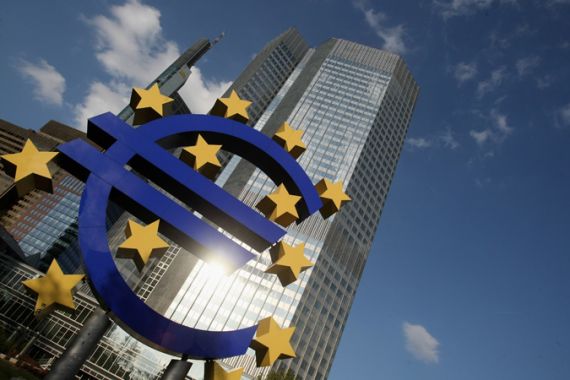Eurozone recession deepened at end of 2012
Figures for final quarter show GDP fell by 0.5 percent, with even major economies such as Germany and France shrinking.

The eurozone slipped deeper into recession in the last three months of 2012 after its largest economies, Germany and France, shrank markedly at the end of the year.
The fall marked the currency bloc’s first full year in which no quarter produced growth, extending back to 1995.
Economic output in the 17-country region fell by 0.6 percent in the fourth quarter, Eurostat, the EU’s statistics office, said on Thursday, following a 0.1 percent drop in output in the third quarter.
Keep reading
list of 4 itemsBehind India’s Manipur conflict: A tale of drugs, armed groups and politics
China’s economy beats expectations, growing 5.3 percent in first quarter
Inside the pressures facing Quebec’s billion-dollar maple syrup industry
The drop was the steepest since the first quarter of 2009. For the year as a whole, gross domestic product (GDP) fell by 0.5 percent.
Analysts said the latest figures were worse-than-expected.
Data so far in 2013 suggested the situation was stabilising, they said, but the outlook remained weak and exposed to key risks, such as the political uncertainty in Italy and Germany ahead of elections later this year.
“The outlook for 2013 remains subdued,” ING Bank analyst Peter Vanden Houte said.
“While a gradual improvement of the world economy is likely to support European exports, domestic demand is bound to remain very weak as fiscal tightening and rising unemployment will take their toll.”
German exports down
Germany contracted by 0.6 percent on the quarter, official data showed, marking its worst performance since the global financial crisis was raging in 2009.
Worryingly for Berlin, it was export performance – the motor of its economy – that did most of the damage, although economists expect it to bounce back quickly.
“In the final quarter of 2012 exports of goods declined significantly more than imports of goods,” the German Statistics Office said in a statement.
France’s 0.3 percent fall was also slightly worse than expectations.
French Prime Minister Jean-Marc Ayrault acknowledged for the first time on Wednesday that weak growth was putting his government’s deficit goal for 2013 out of reach.
Economists say the eurozone may also shrink in the first quarter of 2013 although more resilient Germany is expected to rebound.
“The chances that the [German] economy will return to growth at the beginning of this year are very good. The early
indicators are all pointing upwards,” said Andrea Rees, chief German economist at UniCredit.
“The question is how strong the first quarter will be. We expect growth of 0.3 percent but it could be more.”
Weaker economies
Among the weaker economies in the bloc, Italy suffered its sixth successive quarterly fall in GDP – this time by 0.9 percent – putting it into a longer slump than it suffered in 2008/2009.
Its recession has been deepened by austerity measures that outgoing Prime Minister Mario Monti introduced to stave off a debt crisis.
With an election due on February 24/25, all competing blocs are pledging to cut taxes to try to kickstart economic growth.
Spain, the eurozone’s fourth largest economy, released figures two weeks ago which showed it remained deep in recession after a 0.7 percent contraction in the fourth quarter.
Madrid is also pressing on with harsh austerity measures to cut its debt, but may be given more time to meet its deficit targets by the European Commission if its economy worsens further.